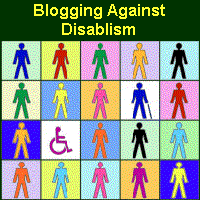We all know how we feel about being disabled, right? And how it feels to be on the receiving end of disablism. But what happens when we encounter people with whom we both share so much and understand so little?
I met up with two friends recently who have a young son with a learning disability. And their experiences opened my eyes to my own views about being disabled and left me with all sorts of questions.
The thing we most definitely agreed on was how dealing with disability on a daily basis would be a whole lot easier were it not for ‘other people’. As my friend observed: “What I hate most of all is the pity factor. The looks. The crass remarks like: “Oh what a shame,” which I find a truly awful way of looking at my son’s life.”
I got a sense that both of them were thoroughly worn down by the reactions of those around them, which had led to a magnification of very complex feelings around their two-year-old having a disability. I could see that even as they loved and accepted their child, other people kept messing it up for them.
As Lily Allen (and countless before her) said: “It’s not me, it’s everybody else,” and this is perhaps never more true than when you are disabled and on the receiving end of at best ill-conceived notions and at worst downright prejudice.
We sat in a sunny park and swapped stories about being ostracised, rejected and misunderstood as my son took their son off for a walk on the grass. Oh to be a kid and just get on with getting on, as my son seemed able to do with effortless ease. Meanwhile, whilst it was good to talk, I found I was checking myself before speaking, and very heightened to the possibility that I may at any point make an enormous gaffe.
Because whilst I am 100 per cent conversant with my own condition and the experience of being an adult with a disability, I am not the parent of a child with a learning disability. I have no idea what it feels like to be ignored by other mums and dads because my child is ‘different’ (though I can have a guess) or pitied by friends and family. I don’t do the pity thing myself when encountering anyone with a disability. I also understand the additional emotional exhaustion that comes with fending off the tide of crap that society dumps on people with disabilities in a myriad of small ways each and every day. But I have no idea how it feels to be a mother, or a father, burning with anger for a child we so desperately love and want people to understand and accept.
“I feel I have to advocate for him. All the time.” My friend said. And I felt sad that she wasn’t really getting the chance to just go out there and be a Mum, doing Mum things with other Mums because the other Mums have rejected them both.
And I found myself talking too much, taking refuge in my well-formed social model observations and perhaps pontificating a little. It was comfortable ground, more comfortable than asking about their son, asking what he likes or doesn’t like, what makes him laugh or, well, really anything that would help me ‘relate’ and not cause offence, like so many other people do with their thoughtless actions.
He doesn’t speak, so he gets ignored. He is developmentally delayed so he doesn’t run about with kids his age. I was aghast at my own lack of imagination, sitting there in the park on a sunny day and feeling totally inadequate. And what shocked me the most was my realisation that just because I have a disability it doesn’t by any stretch of the imagination make me able to ‘cope’ with someone else’s. The common ground was in being reminded of how very angry I was for the first couple of years of being disabled myself. I saw their exhaustion and defiance and totally related. And in seeing it in someone else, a warning bell sounded.
Exhaustion and defiance are understandable reactions, but could the anger, the chippiness be a little counterproductive? It’s easy to see how after constant rejections at playgroup, in cafes, in the park, at family events even, the resentment would set in.
But, and I was so totally reminded of myself in this, the disablism radar can malfunction as a result. If we are too primed for bad reactions, are we at risk of putting people in the dock before they’ve committed an offence?
True, I felt I didn’t cope brilliantly with meeting their son for the first time and I beat myself up afterwards about not making any sort of meaningful connection with him. And my retrospective thinking became little non-disabled for a second as I chewed it over. “Why should I know how to react? Did they do anything to make the situation easier? I was never great with small kids anyway...”
Gah! I couldn’t believe I was thinking this way. But I was. And it also struck me that just as I was trying to get a measure of the situation, I had potentially been quietly sized up myself. My ‘disability credentials’ were not in question. But my first, and very important, reaction to their son most definitely was. And knowing they were potentially sitting back with their arms folded thinking “Well, let’s see what she does...” I felt the most able-bodied I had for years. Inadequate, slightly uncomfortable, and desperately trying not to say the wrong thing.
And for a lot of people out there who are not disabled, this is what it all boils down to. I’m not saying that ill-treatment and prejudice don’t exist...just that lesser forms of disablism that we could potentially help with are out there. Of course any sort of discomfort with disability needs to be addressed. But perhaps if we could go into more exchanges in the spirit of sharing information and fostering understanding, we would achieve more than we ever will by getting angry and defensive. God knows, it’s taken me years to get rid of the chip on my shoulder. Realising that some people will never understand, some can be helped to understand, and some positively want to understand ultimately means that you don’t stay angry with everyone. And it also means you can focus your energy on people who can, and most probably will, make a difference.
Saturday 1 May 2010
Subscribe to:
Posts (Atom)






